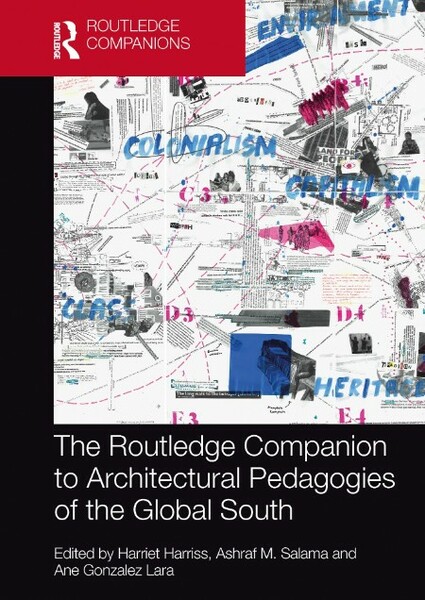Most Commented
The Companion to Architectural Pedagogies of the Global South




Description material

pdf | 41.91 MB | English | Isbn: B0BPJS5LG9 | Author: Harriet Harriss | Year: 2022
Description:
The established canon of architectural pedagogy has been predominantly produced within the Northern hemisphere and transposed – or imposed – across schools within the Global South, more often, with scant regard for social, economic, political or ecological culture and context, nor regional or indigenous pedagogic principles and practices. Throughout the Global South, architecture's academic community has been deeply affected by this regime, how it shapes and influences proto-professionals and by implication architectural processes and outcomes, too.
The Routledge Companion to Architectural Pedagogies of the Global South resituates and recenters an array of pedagogic approaches that are either produced or proliferate from the 'Global South' while antagonizing the linguistic, epistemological and disciplinary conceits that, under imperialist imperatives, ensured that these pedagogies remained maligned or marginalized. The book maintains that the exclusionary implications of architectural notions of the 'orders', the 'canon' and the 'core' have served to constrain and to calcify its contents and in doing so, imperiled its relevance and impact. In contrast, this companion of pedagogic approaches serves to evidence that architecture's academic and professional advancement is wholly contingent on its ability to fully engage in an additive and inclusive process whereby the necessary disruptions that occur when marginalized knowledge confronts established knowledge result in a catalytical transformation through which new, co-created knowledge can emerge. Notions of tradition, identity, modernity, vernacularism, post-colonialism, poverty, migration, social and spatial justice, climate apartheid, globalization, ethical standards and international partnerships are key considerations in the context of the Global South. How these issues originate and evolve within architectural schools and curricula and how they act as drivers across all curricula activities are some of the important themes that the contributors interrogate and debate.
With more than 30 contributions from 55 authors from diverse regional, racial, ethnic, gender and cultural backgrounds, this companion is structured in four sections that capture, critique and catalog multifarious marginalized pedagogical approaches to provide educators and students with an essential source book of navigational steers, core contestations, propositional tactics and reimagined rubrics. The Routledge Companion to Architectural Pedagogies of the Global South pioneers a transposable strategy for academics from all disciplines looking to adopt a tested approach to decolonizing the curriculum. It is only through a process of destabilizing the hegemonic, epistemological and disciplinary frameworks that have long-prescribed architecture's pedagogies that the possibility of more inclusive, representative and relevant pedagogical practices can emerge.
The Routledge Companion to Architectural Pedagogies of the Global South resituates and recenters an array of pedagogic approaches that are either produced or proliferate from the 'Global South' while antagonizing the linguistic, epistemological and disciplinary conceits that, under imperialist imperatives, ensured that these pedagogies remained maligned or marginalized. The book maintains that the exclusionary implications of architectural notions of the 'orders', the 'canon' and the 'core' have served to constrain and to calcify its contents and in doing so, imperiled its relevance and impact. In contrast, this companion of pedagogic approaches serves to evidence that architecture's academic and professional advancement is wholly contingent on its ability to fully engage in an additive and inclusive process whereby the necessary disruptions that occur when marginalized knowledge confronts established knowledge result in a catalytical transformation through which new, co-created knowledge can emerge. Notions of tradition, identity, modernity, vernacularism, post-colonialism, poverty, migration, social and spatial justice, climate apartheid, globalization, ethical standards and international partnerships are key considerations in the context of the Global South. How these issues originate and evolve within architectural schools and curricula and how they act as drivers across all curricula activities are some of the important themes that the contributors interrogate and debate.
With more than 30 contributions from 55 authors from diverse regional, racial, ethnic, gender and cultural backgrounds, this companion is structured in four sections that capture, critique and catalog multifarious marginalized pedagogical approaches to provide educators and students with an essential source book of navigational steers, core contestations, propositional tactics and reimagined rubrics. The Routledge Companion to Architectural Pedagogies of the Global South pioneers a transposable strategy for academics from all disciplines looking to adopt a tested approach to decolonizing the curriculum. It is only through a process of destabilizing the hegemonic, epistemological and disciplinary frameworks that have long-prescribed architecture's pedagogies that the possibility of more inclusive, representative and relevant pedagogical practices can emerge.
Join to our telegram Group
Information
Users of Guests are not allowed to comment this publication.
Users of Guests are not allowed to comment this publication.
Choose Site Language
Recommended news
Commented


![eM Client Pro 9.2.1735 Multilingual [Updated]](https://pikky.net/medium/wXgc.png)






![Movavi Video Editor 24.0.2.0 Multilingual [ Updated]](https://pikky.net/medium/qhrc.png)

